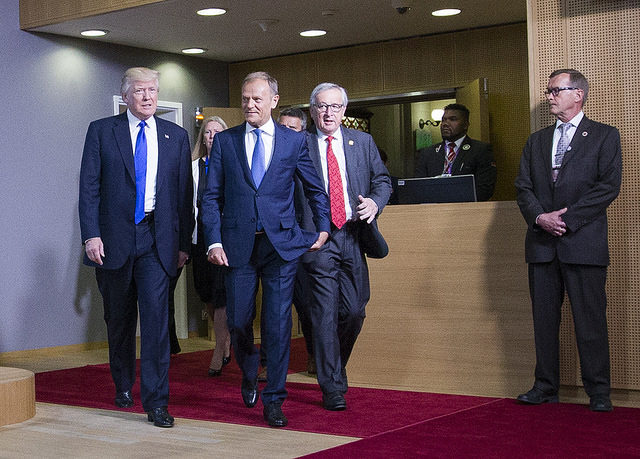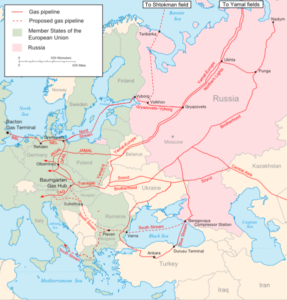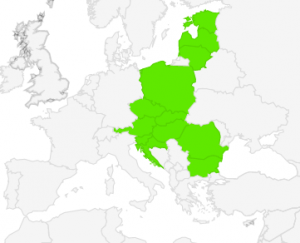 European Council President, Flickr
European Council President, Flickr
Oppose Russian Gas Pipelines to Support European Unity
Russia’s preeminence in the European energy market – supplying 34 percent of European Union natural gas consumption – is an integral part of Russia’s economic model and a tool for geopolitical gain. Russia raises and lowers gas supplies to manipulate energy prices in markets across Europe for Russian economic or political interests. The target of these price changes is often Ukraine – a state who remains the central distributor of Russian natural gas to Europe. Dependence on Ukrainian transportation remains a major geopolitical challenge for Russia. To combat this challenge, Russia is proposing to build natural gas pipelines through the Baltic and Black Seas to bypass Ukrainian energy infrastructure. These pipelines would provide access to European energy markets without Ukrainian distribution which undermines Ukraine’s ability to defend itself and allows Russia to further manipulate energy prices.
Moving towards a standard energy price in the European Union limits Russia’s ability to change energy prices. Russian gas pipelines undermine a common energy price and increase divisions within the EU. The policy of the United States should be continuing to oppose the construction of new Russian natural gas pipelines while financing energy alternatives to preserve the strategic importance of Eastern Europe, limit Russian dominance in the energy market, and work towards European energy security. It is in the national security interest of the United States to support policies which help to unify the European Union, not split it further apart.

Map of Major Gas Pipelines, Samuel Bailey
NordStream 2
While Ukrainian pipelines have theoretical capacity near 120 billion cubic meters per annum (bcma), the pipelines currently operate at half capacity – transporting approximately 60 bcma. Expanding the NordStream Pipeline through the Baltic Sea to Germany would create an additional 55 bcma of natural gas transportation capacity. Thus, the construction of expanded pipelines would allow Russia to completely cut off natural gas supplies through Ukraine with only a 5 bcma differential – probably not enough to severely limit access to energy or raise prices for Europe.
Ukraine serves as an important transit point of Russia’s natural gas into the European market. Annual natural gas transit fees earn Ukraine ~$2 Billion in revenues – a sum equal to almost 10 percent of the state’s budget. This large influx of transit fees from Russia helps Ukraine fund defenses against incursions by Russian-backed separatists. Without these funds, Ukraine would have fewer lines of defense against their aggressive neighbor – forcing NATO and the United States to contribute greater resources to defend Ukraine.
Direct access to the Western European energy markets through Germany would provide Russia greater ability to selectively change gas prices in different regions of Europe. Unlike the United States’ common energy price, Europe’s energy market has different prices across the Union. Russian natural gas pipelines increase price differences between energy markets and make achieving a common energy price within the European Union increasingly difficult. Until a common price is established, energy security within the European Union will be limited and Russia can continue using natural gas supplies to hold Eastern Europe hostage.
Turkish Stream
In addition to the NordStream 2 Pipeline expansion in the Baltic Sea, Russia has negotiated the construction of the Turkish Stream Pipeline through the Black Sea into Turkey. Turkish Stream would have a transportation capacity of 31.5 bcma of natural gas split between two parallel pipes. This increased capacity into Turkey would allow Russia to circumvent Eastern European distribution networks and supply energy to Southern European Union states through Turkey. ASP’s Anna Semler further explains Turkish Stream’s geopolitical consequences.
Turkish Stream includes the benefit of preventing energy shortages for Southern European countries. Cutting off gas supplies to Ukraine, as happened in the winter of 2009, raises energy prices and limits access to heating and electricity – especially in the Balkans. Protecting fellow EU citizens from energy shortages may become a strong consideration for Western Europe to intervene in ending an energy crisis. Rather than solve energy shortages with more Russian gas, the focus should be to achieve greater EU market integration with reduced dependence on Russian gas.

Map of Three Seas Countries
Energy Infrastructure Alternatives
New sanctions on Russia signed into law by President Trump on August 2 give the President the power to impose sanctions on European companies facilitating or investing in Russian gas export pipelines. Importantly, it leaves that option to the President’s discretion. While secondary sanctions on European companies working with Russian pipelines could raise the cost of Russian construction, this move would be widely seen in Europe as an extraterritorial overextension of power by the United States. Although these sanctions could serve our short-term interests, they would cool relations with the EU and could backfire by harming other areas of US-EU cooperation.
Even if never imposed, the threat of secondary sanctions raises the cost-of-capital for Russian gas exporters and makes Russian gas exports less competitive. Rather than inserting itself into an already contentious European energy debate and risking diplomatic tensions, the United States should work to create alternatives to Russian natural gas through financing more LNG import terminals and greater energy integration with projects like the Three Seas Initiative. ASP’s J. Jordan Burns explains the Three Seas Initiative and its impact on energy markets in Europe. The United States should also continue support for the Southern Corridor pipeline to bring American ally Azerbaijan’s gas to Europe through Turkey.
Continuing American opposition to the NordStream 2 pipeline and the Turkish Stream pipeline would help preserve European unity. The United States should avoid risking tensions with the EU through additional sanctions and should instead leverage financing by the Export-Import Bank and Overseas Private Investment Corporation to fund energy infrastructure in Europe. Better energy infrastructure further integrates European energy markets.
More uniform European energy prices limit Russia’s ability to manipulate supply and price. Less price deviation also serves to unify the European Union and reduce intra-Union tensions. Opposing Russia’s geopolitical energy weapon and preserving positive relations with close European allies advances America’s national security interests. A more unified EU backed by NATO is the best option to counter Russian aggression and maintain the security and sovereignty of America’s Eastern European allies.






